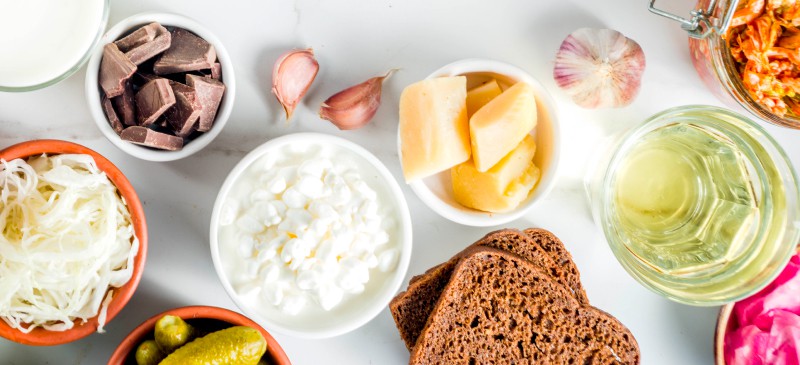Say Goodbye to Digestive Issues with These Delicious Indian Probiotic Foods!

Probiotics are live microorganisms that provide a myriad of health benefits, particularly for gut health. They help balance the digestive system by promoting the growth of healthy bacteria in the intestines, improving digestion, boosting immunity, and even enhancing mental well-being. While probiotic supplements are popular, traditional Indian foods naturally offer an excellent source of these beneficial bacteria.
India’s rich culinary heritage is filled with fermented foods that are not only packed with probiotics but are also delicious. Let’s explore the best Indian foods for probiotics, how they benefit the body, and why they’re crucial for maintaining a healthy gut.
Why Are Probiotics Important?
Probiotics play a vital role in maintaining the balance of good and bad bacteria in the gut. According to Dr. Anuradha Ray, a microbiologist at the Indian Council of Medical Research, “The human gut is home to trillions of bacteria, and probiotics help promote the growth of beneficial microbes, which in turn improve digestion, enhance immunity, and help absorb essential nutrients.” These live cultures can alleviate digestive issues such as constipation, diarrhea, and bloating, and they also strengthen the immune system.
Recent research published in the Journal of Gastroenterology and Hepatology has confirmed that probiotic-rich diets can reduce the risk of gastrointestinal diseases, regulate mood, and improve overall health. So, incorporating Indian probiotic foods into your daily diet is an excellent way to support your digestive health.
Top Indian Foods Rich in Probiotics
1. Curd (Dahi)
Curd, or yogurt, is one of the most popular sources of probiotics in Indian households. Made by fermenting milk with lactic acid bacteria, curd is rich in live cultures such as Lactobacillus and Bifidobacterium, which help improve digestion, boost immunity, and support gut health. Studies have shown that regular consumption of curd can prevent infections, promote bowel movements, and reduce symptoms of lactose intolerance.
How to Incorporate:
- Enjoy a bowl of curd with lunch or dinner.
- Add a pinch of salt and cumin for a cooling raita.
- Use it as a base for smoothies or as a topping for fruit bowls.
2. Buttermilk (Chaas)
Buttermilk, a tangy and refreshing drink, is another probiotic powerhouse. Known as chaas in India, it is a byproduct of churning butter from yogurt and contains live bacteria that are beneficial for the gut. According to a study published in the Nutrition Journal, buttermilk helps reduce acidity and bloating, making it a great choice for people with digestive disorders.
How to Incorporate:
- Drink a glass of chaas post-meal to aid digestion.
- Add spices like cumin, coriander, or ginger for enhanced flavor.
3. Idli and Dosa Batter
Fermented rice and lentil batter used to make idlis and dosas is an excellent source of probiotics. The fermentation process increases the bioavailability of nutrients and promotes the growth of healthy bacteria. Eating idli and dosa regularly can support gut health and provide a good balance of protein and carbohydrates.
How to Incorporate:
- Start your day with steamed idlis or crispy dosas for breakfast.
- Pair them with coconut chutney or sambhar for a nutritious meal.
4. Pickles (Achaar)
Traditional Indian pickles, when made using natural fermentation methods, are a great source of probiotics. Pickles made from vegetables like mango, lemon, and green chilies undergo fermentation with salt, which promotes the growth of good bacteria. These fermented pickles improve digestion and help maintain a healthy gut microbiome.
Note: It is important to choose homemade, naturally fermented pickles over store-bought versions, which may contain preservatives and added vinegar, which kills the probiotics.
How to Incorporate:
- Include a small serving of homemade pickle with your meals.
- Pair pickles with plain rice, parathas, or curd for an added probiotic boost.
5. Kanji
Kanji is a traditional Indian probiotic drink made from fermented black carrots or beetroot and mustard seeds. It is particularly popular in North India during the winter months. The fermentation process gives kanji its tangy flavor and fills it with healthy microbes that aid digestion, improve metabolism, and support overall health.
How to Incorporate:
- Drink a glass of kanji as a refreshing appetizer or digestive tonic.
- Prepare it in small batches during the winter season for optimal probiotic benefits.
6. Fermented Rice (Pazhaya Sadam)
A traditional South Indian dish, pazhaya sadam (also called fermented rice) is made by soaking leftover rice in water overnight. The fermented rice contains lactic acid bacteria, which are known to improve digestion and reduce inflammation. This ancient practice not only preserves the rice but also adds probiotics to your diet.
How to Incorporate:
- Eat fermented rice for breakfast, mixed with curd and salt.
- Add raw onions, green chilies, and curry leaves for added flavor.
7. Bamboo Shoot Ferments (Kharoli)
In the Northeastern states of India, bamboo shoots are fermented and used in various dishes, adding both flavor and probiotics. Fermented bamboo shoots are rich in fiber, antioxidants, and beneficial bacteria that promote gut health. The fermentation process also makes the nutrients in bamboo shoots more bioavailable.
How to Incorporate:
- Add fermented bamboo shoots to curries, soups, or salads for a probiotic-rich meal.
- Use them as a side dish or accompaniment to rice.
The Role of Probiotics in Health
The consumption of probiotic-rich foods has been linked to various health benefits, including improved digestive health, enhanced immune response, and reduced inflammation. Dr. Sandhya Pandey, a nutritionist at Fortis Hospital, notes, “Probiotics help maintain the balance of gut flora, which is crucial for absorbing nutrients, eliminating toxins, and protecting the body from harmful pathogens.”
A healthy gut microbiome can also positively impact mental health. A 2019 study published in Frontiers in Psychiatry highlighted the connection between gut health and mood regulation, showing that probiotics can help alleviate symptoms of anxiety and depression.
Nourishing Your Gut with Probiotics
Incorporating probiotic-rich Indian foods into your diet is an easy and delicious way to maintain gut health and improve overall well-being. From curd and buttermilk to fermented rice and pickles, these traditional foods not only taste great but are packed with the live cultures that your digestive system craves.
By embracing the diversity of India’s culinary heritage, you can naturally boost your intake of probiotics and enjoy the health benefits that come with a well-balanced gut microbiome.






